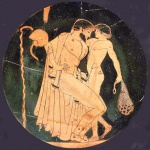Pederasty in the Renaissance: Difference between revisions
Yes,another deletion from Wikipedia. Yes, it needed work, and still does. |
Moved the article from the "Boylove in the Middle Ages" category to the "Boylove in the Renaissance" category |
||
| (7 intermediate revisions by 2 users not shown) | |||
| Line 1: | Line 1: | ||
The Renaissance was a period that saw a rediscovery or renewed interest in the philosophy and art of the Classical period. It also saw a lot of oppression of homosexual and pederastic expressions of attraction by the [[Roman Catholic Church]] especially through the machinery of the [[Inquisition]], most infamously the [[Spanish Inquisition]]. However the Church could not repress all expressions of pederastic desire. One of the most famous examples is a | {{History}} | ||
The Renaissance was a period that saw a rediscovery or renewed interest in the philosophy and art of the Classical period. It also saw a lot of oppression of homosexual and pederastic expressions of attraction by the [[Roman Catholic Church]] especially through the machinery of the [[Inquisition]], most infamously the [[Spanish Inquisition]]. However the Church could not repress all expressions of pederastic desire. One of the most famous examples is a tongue-in-cheek philosophic defense of the practice was provided by [[Antonio Rocco]], in his infamous ''L'Alcibiade, fanciullo a scola ([[Alcibiades the Schoolboy]]'' in English) which tells about a schoolmaster gradually seducing and overcoming his handsome pupil's objections to carnal relations. However given the tongue-in-cheek nature of the writing, it can look unclear if it is meant to be a satire or genuine under the pretense of a joke. This may be why it was possible for it to be written during the oppression of the Catholic Church. | |||
==The Church== | ==The Church== | ||
At the same time, the | At the same time, the Roman Catholic Church, working through the Inquisition courts as well as through the civil judiciary, used every means at its disposal to fight what it considered to be the "corruption of sodomy". Men were fined or jailed; boys were flogged. The harshest punishments, such as burning at the stake, were usually reserved for crimes committed against the very young, or by violence. Not infrequently this was an internecine struggle, as those pursued were often enough men of the cloth.{{Citation needed|date=September 2007}} At the time of the Fifth Council of the Lateran the "monkish canonist" Bermondus Choveronius attacked pederasty,{{Citation needed|date=September 2007}} claiming that because of the diversion of seed from procreation a pederast "destroys the whole human race." | ||
==Florentine pederasty== | ==Florentine pederasty== | ||
| Line 14: | Line 15: | ||
== See also == | == See also == | ||
*[[Pederastic relationships in history - Post-antiquity to present]] | |||
*[[ | |||
==Notes== | ==Notes== | ||
{{reflist}} | {{reflist}} | ||
{{ | |||
{{Navbox Pederasty|collapsed}} | |||
[[Category:Boylove in the Renaissance]] | |||
[[Category: | |||
Latest revision as of 07:01, 7 December 2020
| Part of the boylove history series |
 |
| Portal:History |
The Renaissance was a period that saw a rediscovery or renewed interest in the philosophy and art of the Classical period. It also saw a lot of oppression of homosexual and pederastic expressions of attraction by the Roman Catholic Church especially through the machinery of the Inquisition, most infamously the Spanish Inquisition. However the Church could not repress all expressions of pederastic desire. One of the most famous examples is a tongue-in-cheek philosophic defense of the practice was provided by Antonio Rocco, in his infamous L'Alcibiade, fanciullo a scola (Alcibiades the Schoolboy in English) which tells about a schoolmaster gradually seducing and overcoming his handsome pupil's objections to carnal relations. However given the tongue-in-cheek nature of the writing, it can look unclear if it is meant to be a satire or genuine under the pretense of a joke. This may be why it was possible for it to be written during the oppression of the Catholic Church.
The Church
At the same time, the Roman Catholic Church, working through the Inquisition courts as well as through the civil judiciary, used every means at its disposal to fight what it considered to be the "corruption of sodomy". Men were fined or jailed; boys were flogged. The harshest punishments, such as burning at the stake, were usually reserved for crimes committed against the very young, or by violence. Not infrequently this was an internecine struggle, as those pursued were often enough men of the cloth.[Citation needed] At the time of the Fifth Council of the Lateran the "monkish canonist" Bermondus Choveronius attacked pederasty,[Citation needed] claiming that because of the diversion of seed from procreation a pederast "destroys the whole human race."
Florentine pederasty
Florence was famed for its widespread homosexual culture, which manifested as a normative pederasty involving boys between the ages of thirteen and eighteen in relationship with adult men.[1] This reputation was so much that in 1432 the city established "Gli Ufficiali di Notte" (The Officers of the Night) to root out the practice of sodomy. From that year until 1502, the number of men charged with sodomy numbered greater than 17,000, of which 3,000 were convicted. However this number also includes heterosexual sodomy.
This also gave rise to a number of proverbs illuminating the views of the common people towards the practice. Among them are If you crave joys, tumble some boys. [2]
This reputation is also reflected in the fact that the Germans adopted the word Florenzer, when they were talking about a pederast.[3][4] The Neapolitans on the other hand when speaking of pederasty, called it Il vizio inglese, "the English vice".[5]
See also
Notes
- ↑ At the margins: minority groups in premodern Italy By Stephen J. Milner; p62
- ↑ Florentine proverb, ca. 1480. After Sabadino degli Arienti in Le Porretane.Michael Rocke, Forbidden friendships: Homosexuality and Male Culture in Renaissance Florence, Oxford, 1996; p.87
- ↑ Rocke, Michael, (1996), Forbidden Friendships: Homosexuality and male Culture in Renaissance Florence, ISBN 978-0195122923
- ↑ Ruggiero, Guido, (1985), The Boundaries of Eros, ISBN 978-0195056969
- ↑ R. F. Burton, Terminal Essay
